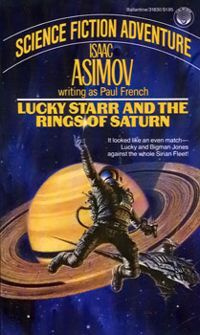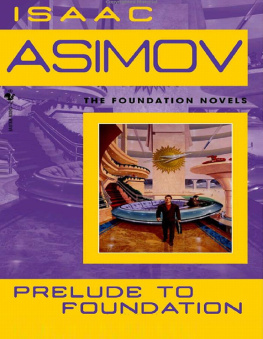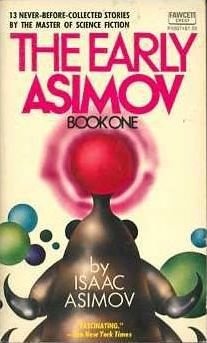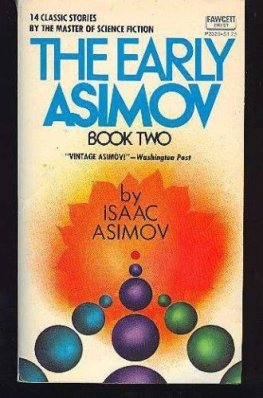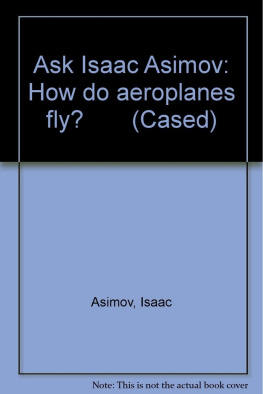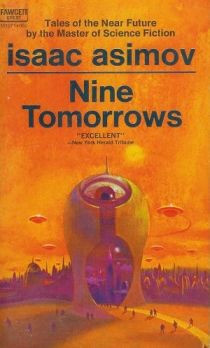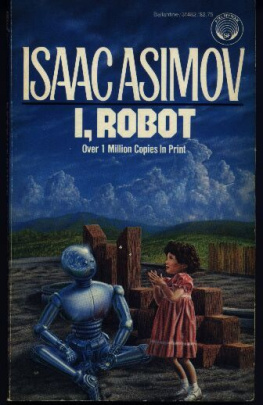Isaac Asimov - Extraterrestrial Civilizations
Here you can read online Isaac Asimov - Extraterrestrial Civilizations full text of the book (entire story) in english for free. Download pdf and epub, get meaning, cover and reviews about this ebook. year: 1979, publisher: Fawcett Columbine Books, genre: Religion. Description of the work, (preface) as well as reviews are available. Best literature library LitArk.com created for fans of good reading and offers a wide selection of genres:
Romance novel
Science fiction
Adventure
Detective
Science
History
Home and family
Prose
Art
Politics
Computer
Non-fiction
Religion
Business
Children
Humor
Choose a favorite category and find really read worthwhile books. Enjoy immersion in the world of imagination, feel the emotions of the characters or learn something new for yourself, make an fascinating discovery.

- Book:Extraterrestrial Civilizations
- Author:
- Publisher:Fawcett Columbine Books
- Genre:
- Year:1979
- Rating:4 / 5
- Favourites:Add to favourites
- Your mark:
- 80
- 1
- 2
- 3
- 4
- 5
Extraterrestrial Civilizations: summary, description and annotation
We offer to read an annotation, description, summary or preface (depends on what the author of the book "Extraterrestrial Civilizations" wrote himself). If you haven't found the necessary information about the book — write in the comments, we will try to find it.
Extraterrestrial Civilizations — read online for free the complete book (whole text) full work
Below is the text of the book, divided by pages. System saving the place of the last page read, allows you to conveniently read the book "Extraterrestrial Civilizations" online for free, without having to search again every time where you left off. Put a bookmark, and you can go to the page where you finished reading at any time.
Font size:
Interval:
Bookmark:
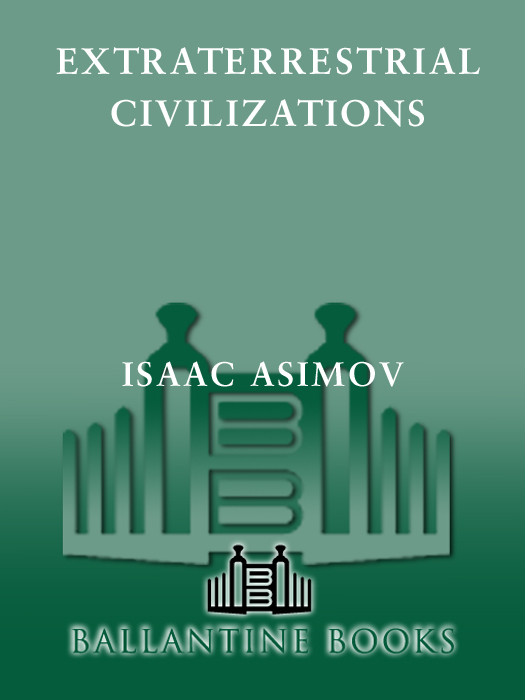
Also by Isaac Asimov:
EARTH: OUR CROWDED SPACESHIP
REALM OF NUMBERS
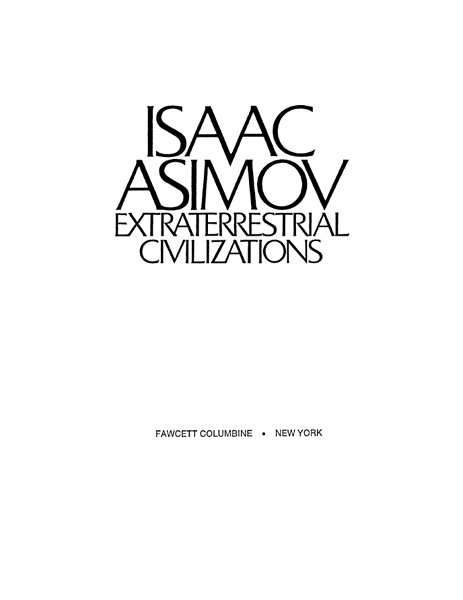
EXTRATERRESTRIAL CIVILIZATIONS
THIS BOOK CONTAINS THE COMPLETE TEXT OF THE
ORIGINAL HARDCOVER EDITION.
Published by Fawcett Columbine Books, a unit of
CBS Publications, the Consumer Publishing Division of
CBS Inc., by arrangement with Crown Publishers, Inc.
Copyright 1979 by Isaac Asimov
ALL RIGHTS RESERVED
eISBN: 978-0-307-79230-3
v3.1
To the memory of Paul Nadan (1929-1978)
for whom I should have
started the book sooner.
The question is: Are we alone?
Are human beings the only possessors of eyes that probe the depths of the Universe? The only builders of devices to extend the natural senses? The only owners of minds that strive to understand and interpret what is seen and sensed?
And the answer is, just possibly: We are not alone! There are other kinds that seek and wonder, and do so perhaps even more effectively than we.
Many astronomers believe this is so, and I believe this is so.
We dont know where those other minds are, but they are somewhere. We dont know what they do, but they do much. We dont know what theyre like, but they are intelligent.
Will they find us if they are somewhere out there? Or have they found us already?
If they have not found us, can we find them? Better yet, should we find them? Is it safe?
These are the questions that must be asked once we agree that we are not alone, and astronomers are asking them.
The whole matter of the search for extraterrestrial intelligence has now become so common, in fact, that it has been abbreviated to save trouble in referring to it. Astronomers now refer to it as SETI, from the initials of the phrase the search for extraterrestrial intelligence.
The first scientific discussion of SETI that offered a hope of carrying through the search successfully came only in 1959. It is natural to suppose, then, that the question of intelligence other than our own is of recent vintage. It would seem to be entirely a twentieth-century phenomenon arising out of the advance of astronomy in recent decades. It would seem to be the child of rocketry and of manned flight in outer space.
Perhaps you may feel that prior to the last few decades, human beings took it for granted that we were alone, and that the new view of other-intelligence is coming as a great shock to people and is forcing them willy-nilly to undergo an internal revolution of outlook.
Nothing could be farther from the truth!
It has been taken for granted by almost all people through almost all of history that we are not alone. The existence of other intelligences has been accepted as a matter of course.
Such beliefs have not arisen through the advance of science. Quite the contrary. What science has done has been to remove the supports from under the early casual assumptions as to the existence of other-intelligence. Science has created a new view of the world around us in which, by the old standards, humanity stands alone.
Let us start with that establishment of aloneness before we can go on to a new view of a new kind of other-intelligence.
To go back to the beginning, we will have to recognize that the phrase extraterrestrial intelligence is already sophisticated. It refers, after all, to intelligence found on worlds other than Earth and for it to have meaning there must be some recognition that worlds other than Earth exist.
To the vast majority of human beings, however, through almost all of history, there were no worlds other than Earth. Earth was the world, the home of living things. The sky, to early observers, was exactly what it appeared to be: a canopy overhanging the world, blue by day and punctuated by the round glare of the Sun; black by night and pin-pricked with the brightness of the stars.
Under those conditions, the phrase extraterrestrial intelligence has no significance. Let us talk, instead, of nonhuman intelligence.
As soon as we do that, we can see at once that human beings of the prescientific age always assumed that humanity was not alone; that the one world they thought of as filling the universe contained a variety of nonhuman intelligences. Not only was human intelligence one of very many, but it was very likely to be the weakest and least advanced of all.
To the prescientific mind, after all, events in the world seemed whimsical and willful. Nothing followed natural and inexorable law because law was not recognized as part of the Universe. If something happened unpredictably, it was not because not enough was known to predict it, but because every part of the Universe was behaving with free will and doing things through some uncomprehended motivationthrough even, perhaps, an incomprehensible motivation.
Free will is inevitably associated with intelligence. To do something willful, after all, you have to understand the existence of alternatives and choose among them, and these are attributes of intelligence. It seemed to make sense, therefore, to consider intelligence a universal aspect of nature.
To the early Greeks (whose myths we know best), every aspect of nature had its spirits. Every mountain, every rock, every stream, every pool, every tree, had its nymph, marked not only by intelligence but even by a more or less human shape.
The ocean had its deity, as did the sky and the underworld; they were given human attributes such as childbirth and sleep, and various levels of abstraction such as art, beauty, and chance.
As time went on, Greek thinkers grew sophisticated enough to view all these spirits and deities as symbols, and to strive to withdraw them from human associations.
Thus, Zeus and his fellow gods were thought to live on Mount Olympus in northern Greece to begin with, but were later transferred to a vague Heaven in the sky.case of the God of the Israelites, who originally lived on Mt. Sinai or in the Ark of the Covenant, but who was eventually relocated to Heaven.
In the same way, the world of the spirits of the dead could be thought of at first as sharing the one world with the living. Thus, in the Odyssey, Odysseus visits Hades in some vague spot in the far West, and it is somewhere in the West that the Elysian Fields, the Greek Paradise, may also have existed. The spirits of the dead were eventually transferred to a semimystical underground Hell.
Nevertheless, this process of sophisticated abstraction is a purely intellectual phenomenon intended to save the thinker the embarrassment of unsophisticated opinions. They rarely affected the common person.
Thus, whatever the Greek philosopher may have thought as to the cause of rain, the common uneducated farmer may have thought of rain (as Aristophanes jokingly says in one of his plays) as Zeus pissing through a sieve.
In the contemporary United States, meteorology is a complex study, and the changes in weather are treated as natural phenomena that follow laws so complex, alas, that even yet we do not thoroughly understand them and can predict with only moderate accuracy. To many Americans, however, a drought, for instance, is the will of God, and they flock to the churches to pray for rain under the impression that the plans God has made are so trivial and unimportant that He will change them if asked to do so.
Font size:
Interval:
Bookmark:
Similar books «Extraterrestrial Civilizations»
Look at similar books to Extraterrestrial Civilizations. We have selected literature similar in name and meaning in the hope of providing readers with more options to find new, interesting, not yet read works.
Discussion, reviews of the book Extraterrestrial Civilizations and just readers' own opinions. Leave your comments, write what you think about the work, its meaning or the main characters. Specify what exactly you liked and what you didn't like, and why you think so.



